There is an urgent need to address the problem of inadequate funding for postgraduate studies in South Africa. This was the recurring consensus during the recent North-West University (NWU) donor event held in Sandton, Johannesburg.
Speakers included Dr Anna Mokgokong, chancellor of the NWU; Dr Bismark Tyobeka, principal and vice-chancellor; and Percy Moleke, chair of the NWU Donor Council. “We need to develop our country and its economy from a pool of postgraduates," said Dr Tyobeka. Undergraduates cannot sustain the growth and development of a country. A first qualification is not advantageous in the current South African labour market. Therefore, it is crucial to encourage our students to pursue postgraduate degrees,” he said.
Dr Tyobeka cited a variety of issues that have an impact on higher education, underlining the high percentage – 49% – of NWU students who are dependent on the National Student Financial Aid Scheme (NSFAS) funding for their study as one of the most significant. He said, “Nearly half our student enrolment is supported by NSFAS, and this poses a very serious risk because of the worrying current trends in the government.” Due to the system's current inadequacies, there is no assurance that the students who depend on NSFAS will receive their monthly stipend. The NSFAS organisation insists on managing the entire operation autonomously despite the fact that it is a systemically deficient organisation that is still relatively young. Just recently, the Special Investigating Unit (SIU) announced that it will open an investigation into possible misuse of funds at the NSFAS.
He raised concerns that these NSFAS-related risks will be transferred entirely to the university. “If the NSFAS engages in malfeasance, it will directly affect us as an institution, as students may direct their discontent at the institution,” he added.
The NSFAS concept was a noble concept, according to Dr Tyobeka, but given the country's current economic challenges, it is proving to be a framework whose viability is still very much in question. “If the issues are not swiftly resolved, it is doubtful whether the government would continue to prioritise the funding of higher education,” he concluded.
Dr Tyobeka appealed to certain donors to disengage from the notion that the NSFAS has closed the “funding gap”. He cautioned donors: “We perceive the current impediments within the organisation to be a cause for serious concern and that you may inevitably be requested to provide funding, as the NSFAS may be on the verge of being unable to fulfil its obligations.”
There are some positive insights that Dr Tyobeka reflected on as well, such as the results of the Universum survey, which is a global data-driven, insight-led employer branding agency that focuses on brand perception. A total of 15 448 students and 4 185 alumni participated in it, and the results indicated an overall positive sentiment regarding their perceptions of the university in terms of its brand, student assistance, student life experiences, academic support, programmes, and so forth.
“They used words like excellent, excellence, diversity, success, development, good and future to describe how they felt about us. Our alumni shared the same sentiment. In terms of reputation perception, most of our students gave us a 73% positive rating. According to our students, research excellence is expressed at 50%, while successful alumni are shown at 52%. A total of 62% of our alumni and 59% of our students said they would choose to study with us once more. It demonstrates that the NWU brand is engrained in our students' DNA,” he continued.
He indicated that with the current figure of 7 409 registered postgraduate students, funding needed to be doubled should the university wish to increase this number. Developed countries such as South Korea, Singapore, the Russian Federation and India are all investing in postgraduate studies. Without this, their country’s level of knowledge would not grow.
Funding is a challenge, with NWU Donor Board chairperson Ms Percy Moleke appealing to donors to continue strategising and aligning their goals with finding solutions. She explained, "It is well known that the NSFAS does not provide funding for postgraduate studies, and the only funding source available is the NRF, whose budget is constrained. To survive, the NWU and the entire higher-education system will need to construct its own timber. We will all succeed in this endeavour if we guide our young people through honours-degree, master’s-degree and PhD studies. It is crucial that we concentrate our efforts as donors on raising funds for postgraduate students. In addition, most of our funding goes to science, technology, engineering and maths (STEM), which is necessary. However, we need to focus on supporting the arts as well.” Through her engagement with students, she expressed confidence in the future of our country. "The future looks very bright, all we need to do is support our young people even further, not only financially, but also in other ways,” she concluded.
NWU chancellor Dr Anna Mokgokong shared her views with donors. "We live in an ever-changing world, which compels us to look differently at difficulties and how to overcome these challenges," she stated. The NWU is actively looking for ways to adjust to societal changes, much like many other outstanding institutions of higher learning. She claimed that this university's standing as one of the best in the nation and the annual rise in national and international rankings are testaments to its high calibre. The quality of this university is reflected in the fact that it is one of the top universities in the country and that we improve every year in national and international rankings, she said.
Dr Mokgokong expressed the view that the NWU is constantly seeking new ways to improve the lives of its students and those of the communities it serves, indicating that this journey brings about its own challenges. One of the main challenges faced is limited resources, she indicated, especially financial resources to assist students. “The harsh reality is that the government’s capacity to support higher education through grants and bursaries is under immense pressure. Securing additional sources of financial support is vital for the university and especially its students,” she mentioned.
For the university to reach its strategic goals and to continue to grow from strength to strength, donors’ continued support is needed, she said, adding that this matter is a very complex one as there are many reasons for this dilemma the country finds itself in. “At many universities, you will find that output and performance are not satisfactory,” she emphasised, and appealed to corporate donors to use mentorship programmes to facilitate the success and development of students. She encouraged them to continue offering financial assistance to compensate for the displaced middle and graduate students. "The NWU would not have been able to build and maintain its ability to contribute towards the transformation of South Africa through teaching and learning, research and innovation and community engagement without your kind donations and time. I commend all NWU donors and want to encourage you to go out and motivate your counterparts and associates to support the institution's efforts.”
According to Dr Mokgokong, the accomplishments of the university are made possible by the support of its partners and donors, who take pride in the NWU's vision and are dedicated to improving the lives of its students. "You, our supporters and donors, have made us great, seeing our children evolve into tomorrow's leaders, and seeing the influence they have on the progress and evolution of our nation is both gratifying and humbling,” she added.
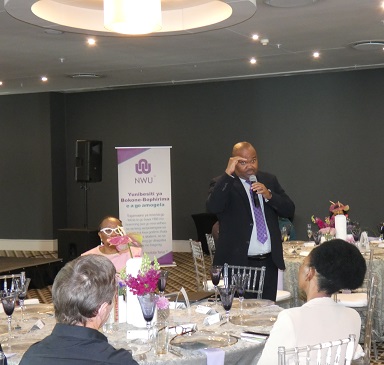
Dr Bismark Tyobeka, NWU principal and vice-chancellor

Mr Clement Manoko Executive Director: Corporate Relations and Marketing
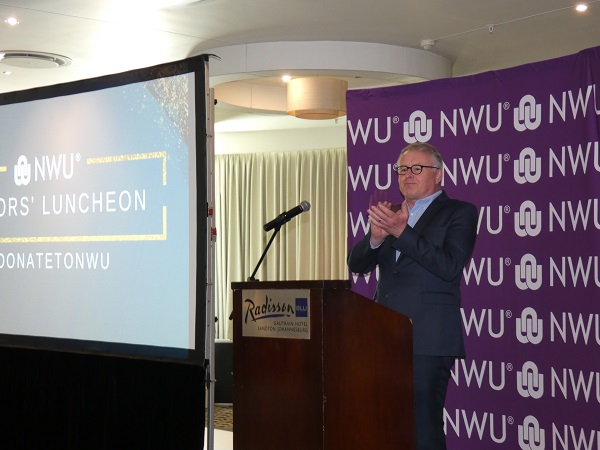
Ben Zaaiman, senior manager at Development and Fundraising at the NWU
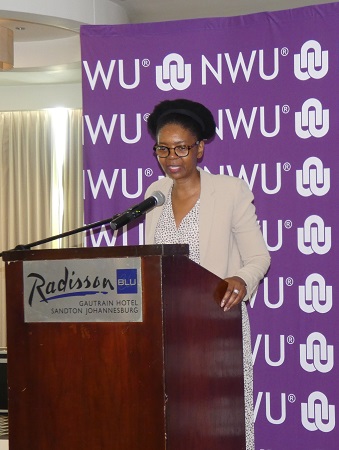
Percy Moleke, chair of the NWU Donor Council
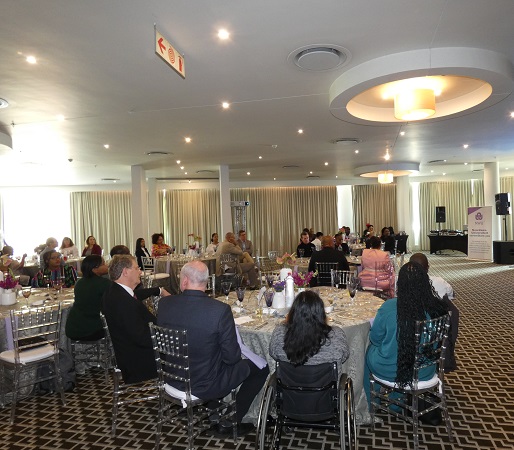
Donors and guests

(Left to right) Former North-West University (NWU) vice-chancellor Dr Theuns Eloff, Dr Bismark Tyobeka, NWU principal and vice-chancellor and Dr Anna Mokgokong, NWU chancellor
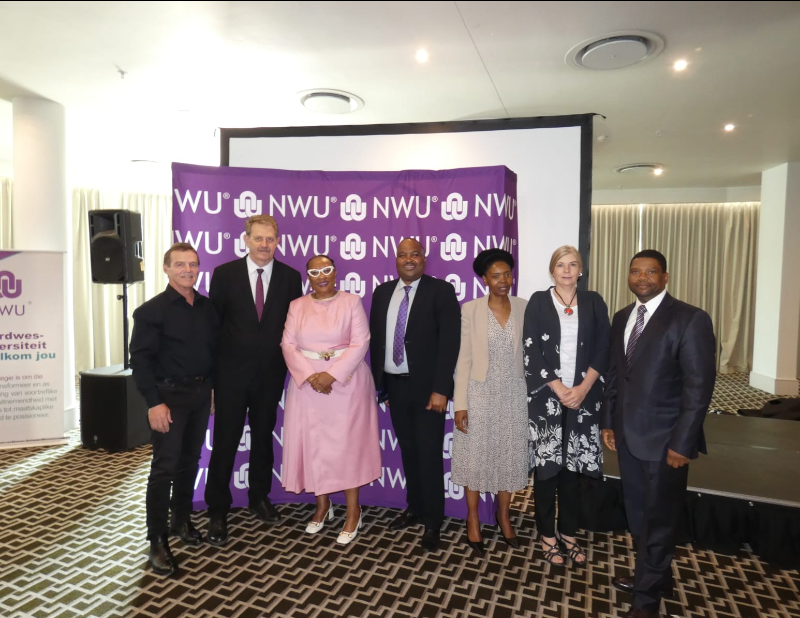
(Left to right) Former North-West University (NWU) vice-chancellor Dr Theuns Eloff, North-West University (NWU) council chairperson, Bert Sorgdrager, Dr Anna Mokgokong, NWU chancellor; Dr Bismark Tyobeka, NWU principal and vice-chancellor; and Percy Moleke, chair of the NWU Donor Council, Prof Linda du Plessis, Deputy Vice-Chancellor: Planning and Campus Operations (Vanderbijlpark campus) and Prof Jeffrey Mphahlele, Deputy Vice-Chancellor: Research and Innovation
